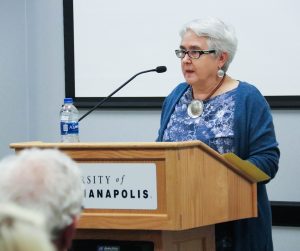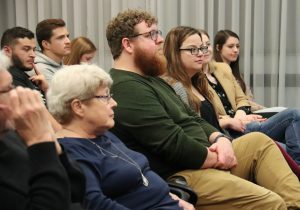Artistic expression can serve as a coping mechanism, a means by which one can make sense of the traumas and successes of human life, according to the American Journal of Public Health. Whether it be through writing, art or even dance, the usage of artistic engagement can have positive effects on health. Retired Professor of English Elizabeth Weber utilizes this mentality through her writing, often exploring themes of family, friends and her own identity in order to make sense of her varied experiences.

“A lot of people have died. My father is in the process of dying, and he’s always just been there. Four or five other people are dying, [in my life] too,” Weber said during a poetry reading on Mar. 20. “I’ve been thinking about death a lot. So naturally, I’ve been writing about it… This acts as a kind of healing process.”
Weber, whose essays have appeared in numerous renowned journals, was a professor at the University of Indianapolis for 23 years. During the course of her career, Weber founded the Kellogg Writers Series alongside Bruce Gentry and has published numerous poetry collections, including “Small Mercies,” “The Burning House” and “Porthole Views: Watercolors and Poems.” In these works and others, Weber makes distinct use of vivid imagery and diction in order to illustrate her life events in a way that evokes emotion and consideration of place.
Junior sports management major Jack Erickson said that Weber’s words had a way of grounding him in her story.
“Dr. Weber did an amazing job conveying her emotions to the audience with her words. You can just really feel her personal, emotional connection to each poem,” Erickson said. “One thing that stood out to me was how she was just able to put her personal relationships and feelings out there into the world and how she turned every day events into something worth writing about.”
Throughout the course of her poetry reading, Weber shared nine poems and one essay, each of which detailed an important or interesting moment in her life. Kicking off the evening was her poem “Coming Home,” which featured a recurring theme in her writing: coming to terms with her older brother’s death.
“You can just really feel her personal, emotional connection to each poem.”
On Feb. 12, 1968, when Weber was seventeen years old, she lost her brother in the Vietnam War. He was a radio operator killed entirely by accident, as the Viet Cong firing in his direction had only intended to dismantle the machine he was operating. “Coming Home” was an analysis on her father, and how he dealt with the loss of her brother.
“At one point, I blamed my father for it [my brother’s death],” Weber said. “I think I just was so full of grief that I was into blaming. So I actually told him at one point, ‘you killed my brother.’ But I apologized later on”
Weber’s subsequent poems operated in a similar fashion in how they analyzed and interpreted various events throughout her life, no matter how simple. Finding the poetic in everyday occurrences is a recurring theme in Weber’s work. One poem, titled “In the Locker Room,” served as an analysis on both the simplicity and complexity of women’s bodies when naked, unassuming and unpressured. The inspiration for the poem was, she said, very mundane: simply running into her professor in the locker room.

“One time, I was working on my doctorate, and I tell you, without my glasses, I am blind. I had my glasses off, and I was coming out of the shower, and there was my professor,” Weber said. “And I said, ‘oh my goodness, how weird,’ because she was also naked… She looked too human and the same.”
Weber’s final piece was an essay titled “The Substitute,” which recounted the grief and confusion in the aftermath of her brother’s death, framed around her experience with a substitute in her high school calculus class. The piece dove into Weber’s first experience with understanding and coming to terms with death, from the moment soldiers showed up to her doorstep to the repercussions the tragedy had on her school life.
Now, Weber said she believes that her writing aims to make sense of her memories, both in regards to past tragedies and current ones. For years, Weber has been the caregiver for her 101-year-old father, who she has watched deteriorate from dementia and aphasia.
According to Weber, her poems “Goodbye, My Fancy” and “The Dead” cover the topic of grief as well. Her writing conceptualizes grief in ways that, according to Erickson, perhaps not only works to heal her, but her readers.
“To create dialogue about loss and grief so openly, especially with college students, is a brave and important thing to do,” Erickson said. “It made me really stop to consider the role of grief in my life, and how I can work in my own way to understand it.”






